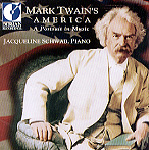From the title, this recording at first seems like a gimmick–and it is, but not in a bad sense. The period of Mark Twain’s life (1835-1910) was a crucial one in the development of many cultural aspects of American society, not least of which was music. And, as the detailed liner notes attempt to show, Twain had some very definite ideas about what music was for, what he liked and didn’t like, and which instruments were best–the piano, which he played, and the banjo, about which he said “When you want genuine music–music that will . . . break out on your hide like the pinfeather pimples on a picked goose. . . just smash your piano and invoke the glory-beaming banjo!” The notes also document some of his favorite songs (“Flow gently, sweet Afton”, included here) and elaborate on the kinds of music other folks were listening to and playing in their parlors during the late-19th/early-20th centuries.
As you listen to solo pianist Jacqueline Schwab, whose excellent Christmas recording was reviewed last year (type Q423 in Search Reviews), you may think you’ve been transported to a Ken Burns documentary–and you wouldn’t be far off, because her gently ornamented, subtly improvisatory style has stamped many of that filmmaker’s classics (such as the Civil War, Lewis and Clark, and, yes, the recent Mark Twain). Her efforts here are somewhat uneven, compared to her previous work. That is, she seems to have become much fussier and more mannered, at least on many of these selections–the opening medley, for instance. And she just hammers away on “The Battle Hymn of the Republic” and on several other pieces, a style that’s more jarring than interpretively affecting.
She’s best when she just slides right into the music and spins and weaves and caresses those melodies, dressing them with perfectly turned frills and ornaments, discreetly pausing, then moving quickly on–“‘Tis the last rose of summer”; “Beautiful Dreamer”. It’s when she gets too self-aware and introspective that the linear flow stops and we find ourselves fruitlessly trying to urge her forward. These parlor songs, hymns, and spirituals just need to roll, swinging or swaying, dancing or praying, mindful of their origins, family and friends and congregation, singing along. Schwab certainly is a competent pianist and an excellent improviser, and as much as I’ve enjoyed her past performances, these leave me alternately smiling and humming and slightly unsettled and inattentive. The sound is Dorian’s typically clear, detailed, natural piano quality, recorded in its home venue, the Troy Savings Bank Music Hall. [9/11/2001]
































